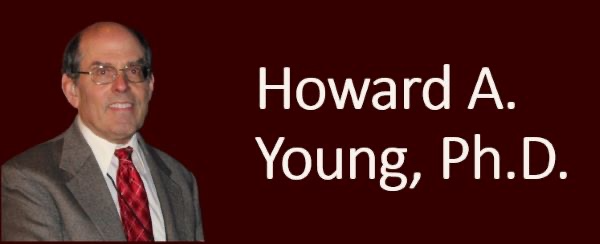

Katherine Fitzgerald is awarded the 2024 ICIS-Howard A. Young Distinguished Service Award in recognition of her extraordinary contributions to the ICIS, most especially her presidential leadership during the two worst years of the COVID-19 pandemic. As a highly successful Professor and investigator with a strong commitment to the future of immunological sciences, she has risen to the highest level of scientific excellence in our field, yet she still finds the time to provide “above and beyond” service that furthers the goals of the ICIS. Professor Fitzgerald is a role model for all cytokine biologists, personifying the standard of service to the organization established by Howard A. Young himself. Read more.
Past Award Winners:
Brendan J. Jenkins was honored with the 2023-ICIS Distinguished Service Award
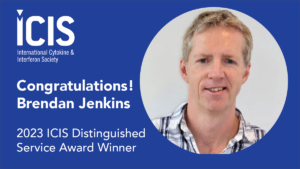 Professor Brendan J. Jenkins
Professor Brendan J. Jenkins
Centre Director, Centre for Innate Immunity and Infectious Diseases, Hudson Institute of Medical Research, Melbourne, Australia (until July, 2023)
Program Head, Tumour Inflammation and Immunotherapy Program, South Australian immunoGENomics Cancer Institute SAiGENCI (beginning in July, 2023), The University of Adelaide, Adelaide, South Australia. Brendan Jenkins has been selected as the recipient of the ICIS 2023 Distinguished Service Award in recognition of his reputation in the community as both an outstanding cytokine scientist and a remarkably dedicated member of the ICIS. As the lead organizer of the annual meeting in Melbourne in 2014 and his continued service to the Society since 2016 as the Chair of the ICIS Meetings Committee. This is not a simple task and is an area where Brendan has dedicated himself to making this a transparent and fair process. The society benefits tremendously from his participation and service. The Awards Committee has chosen Brendan for this award in appreciation of his long-term commitment to cytokine & interferon research, and his all-important contributions to our society. MORE DETAILS
Curt M. Horvath is honored with the 2022-ICIS Distinguished Service Award
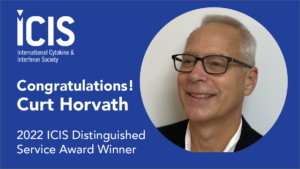 Curt M. Horvath is honored with the 2022 ICIS-Distinguished Service Award in recognition of his reputation in the community as both an outstanding cytokine scientist and a remarkably dedicated member of the ICIS. Dr. Horvath has long served on the ICIS council (2014 until present) from his first term being instrumental in facilitating the unification of the ICS and ISICR, helping to find common ground among challenging territorial disputes between the two societies. In his current Council term he initiated discussion on inclusion of young investigators in the ICIS leadership and advocated for creation of new council seats to include our newest members in ICIS leadership, based on inclusion and training which is already making an impact on the Cytokines annual meeting program organization and diversity goals. He is known for mentoring interactions with diverse groups of junior faculty, postdocs, and graduate students, participating in Networking Workshops for Young Investigators, and is a regular and enthusiastic participant in spontaneous ICIS jam sessions. MORE DETAILS
Curt M. Horvath is honored with the 2022 ICIS-Distinguished Service Award in recognition of his reputation in the community as both an outstanding cytokine scientist and a remarkably dedicated member of the ICIS. Dr. Horvath has long served on the ICIS council (2014 until present) from his first term being instrumental in facilitating the unification of the ICS and ISICR, helping to find common ground among challenging territorial disputes between the two societies. In his current Council term he initiated discussion on inclusion of young investigators in the ICIS leadership and advocated for creation of new council seats to include our newest members in ICIS leadership, based on inclusion and training which is already making an impact on the Cytokines annual meeting program organization and diversity goals. He is known for mentoring interactions with diverse groups of junior faculty, postdocs, and graduate students, participating in Networking Workshops for Young Investigators, and is a regular and enthusiastic participant in spontaneous ICIS jam sessions. MORE DETAILS
The 2021 ICIS Distinguished Service Award Winner is Nancy C. Reich Marshall
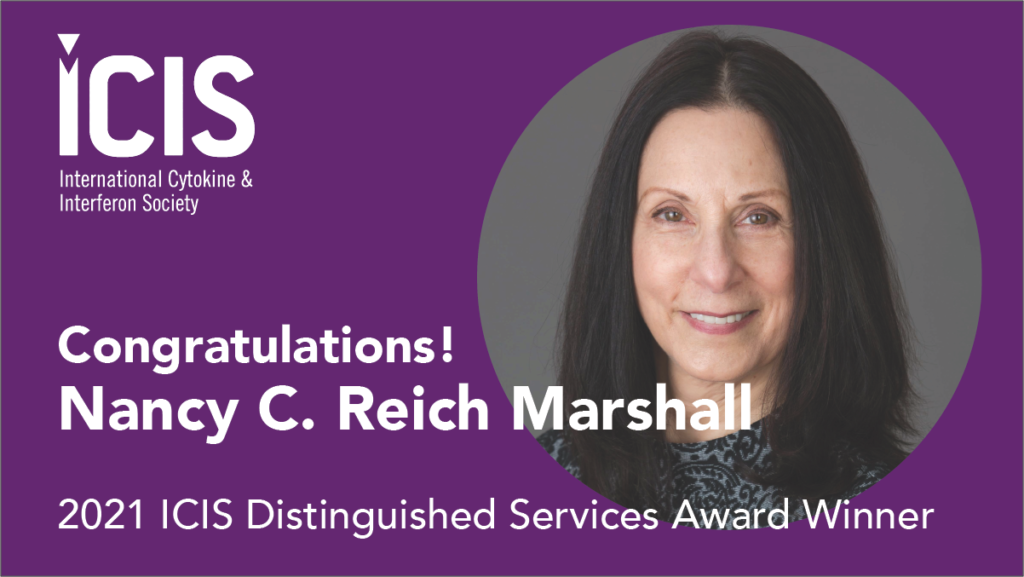
Nancy C. Reich Marshall, PhD, Professor, Microbiology & Immunology, Stony Brook University, Stony Brook, USA
Fellow of The American Association for the Advancement of Science (AAAS)
Fellow of The American Academy of Microbiology (AAM)
Dr. Nancy Reich is honored with the ICIS Distinguished Service award in recognition of her extraordinary contributions to the cytokine research community. She has been active as a member in the ISICR and ICIS since 1987. Dr. Reich served as a member of the Meetings Committee, Awards Committee, Nominating Committee, International Council, and co-Chaired the Society annual conference in Puerto Rico 2004. Following her election as ICIS President-Elect in 2015, she Chaired a Reorganizing Committee and was responsible for streamlining the management of the organization to better serve the needs of the community. Subsequently as ICIS President, she implemented policies to further enhance the standing of the ICIS internationally, and also to ensure that members engaged in the ICIS. Dr. Reich is respected for her perspective, thoughtful input, and service. Dr. Reich has been and continues to be an invaluable member of the ICIS, engaging in Society activities and contributing in many different areas of decision making. Her research accomplishments were recognized by the Society as a 2005 recipient of the Vivian and Seymour Milstein Award for Outstanding Interferon and Cytokine Research. Dr. Reich is also a dedicated science educator and has personally guided the research training of 20 Ph.D. candidates, seeding the community with highly trained scientists. FULL DETAILS
2020:
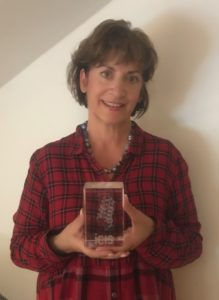 Joan Saluzzi-Oefner, Managing Director, International Cytokine & Interferon Society (ICIS)
Joan Saluzzi-Oefner, Managing Director, International Cytokine & Interferon Society (ICIS)
Joan Oefner is honored with the 2020 ICIS Distinguished Service award in recognition for her extraordinary contributions and service to the ICIS and to the cytokine research community at large. Since she joined our Society as Managing Director in 2016, she has reached far beyond expectations to ensure the administrative, conference, and financial success of ICIS and has devoted significant time and energy to further the goals of the Society.
Joan founded her association management company in San Francisco in 1993 to support international scientific and medical societies. After moving to Germany in 2005, she reorganized to a virtual business model.
Joan received her Bachelor of Arts, Psychology, in 1982 from the University of Colorado, Boulder. She obtained the CAE (certified association executive) designation in November 1998 from the American Society of Association Executives. She is married to one of her first clients, Peter Oefner, who is Chair of the Department of Functional Genomics, Institute of Functional Genomics at the University of Regensburg (thus the move to Germany), and has 20 year old twins, Wolfgang and Hannah.
2019:
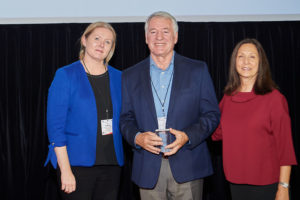 Bryan R.G. Williams, PhD, Hon. FRSNZ, FAA, Hudson Institute of Medical Research, Clayton, Australia
Bryan R.G. Williams, PhD, Hon. FRSNZ, FAA, Hudson Institute of Medical Research, Clayton, Australia
Bryan R. G. Williams, PhD, Hon. FRSNZ, FAA is honored with the 2019 ICIS Distinguished Service award in recognition of his extraordinary contributions to the cytokine research community.
Professor Williams is Emeritus Director and Distinguished Scientist, Hudson Institute of Medical Research, Professor, Department of Molecular and Translational Science, Monash University. A distinguished researcher and international authority on innate immunity and cancer biology, Professor Bryan Williams has made major contributions to our understanding of the antiviral mechanisms of actions of interferons, advancing their therapeutic utility. His discoveries in the 2-5A-RNaseL pathway, cloning and characterization of protein kinase R, and innate immune signalling pathways have opened new therapeutic opportunities. FULL DETAILS
2018:
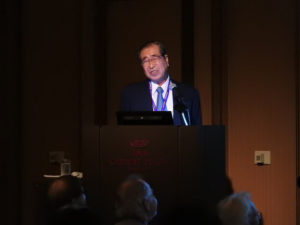 Tadamitsu Kishimoto, MD, PhD, Professor Emeritus, Osaka University, Osaka, Japan
Tadamitsu Kishimoto, MD, PhD, Professor Emeritus, Osaka University, Osaka, Japan
Professor Emeritus, Tadamitsu Kishimoto, MD, PhD, is honored with the 2018 ICIS Distinguished Service award in recognition of his extraordinary contributions to science, teaching and drug development within the field of cytokine research. The 2018 ICIS Distinguished Service Award acknowledges Kishimoto’s career-long achievements to the field of cytokine research including his commitment to supporting the next generation of scientists as a mentor, teacher and tireless advocate for young investigators.
As a pioneer in the field of cytokine research, Professor Kishimoto is responsible for transforming the cytokine field from a descriptive and phenomenological discipline to one firmly anchored in the molecular biomedical sciences. Perhaps foremost in his career, Dr. Kishimoto discovered and cloned interleukin-6 and its receptor components, IL-6Ralpha and gp130. In the course of the work, Kishimoto also defined the signal pathway including the cloning of the transcription factors NF-IL-6 and STAT3, both central factors in the action of IL-6, and discovery of the negative regulators of cytokine function, suppressors of cytokine signaling (SOCS) family.
Kishimoto is also credited with description of IL-6 in the pathogenesis of cardiac myxomas, multiple myeloma, Castleman’s disease, rheumatoid arthritis, Crohn’s disease and juvenile idiopathic arthritis. Recognizing the importance of this pathway to human health, Kishimoto was instrumental in developing the anti-IL-6Ralpha monoclonal antibody ACTEMRA® (tocilizumab) which has provided therapeutic benefit across several auto-inflammatory diseases including rheumatoid arthritis and juvenile idiopathic arthritis. That his work has spanned from discovery to the development of an effective therapeutic highlights the breadth and depth of his accomplishments.
With the awarding of the 2018 ICIS Distinguished Service Award, the Society wishes to acknowledge Dr. Kishimoto’s great contributions to the field of cytokine research over many decades. Of note, he organized the Cytokine Workshop in Kobe in 1993, as President of the International Cytokine Society in 1995 (which merged with the ICIS in 2013), and as Honorary President of the ICIS meeting in Kanazawa in 2017. His financial contributions to the Kanazawa meeting doubled the amount of travel awards made available to Young Investigators which contributed to the success of that meeting. He continues to encourage young investigators by administering the Tadamitsu Kishimoto International Travel Award to support around 40 Japanese Society for Immunology (JSI) members presenting his/her data at an international meeting, including the ICIS Annual Cytokines meetings.
2017:
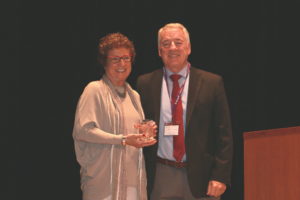 Eleanor Fish, Ph.D., CRC Women’s Health & Immunobiology, Senior Scientist, Toronto General Hospital Research Institute, University Health Network, Professor, Dept. Immunology, University of Toronto, Canada
Eleanor Fish, Ph.D., CRC Women’s Health & Immunobiology, Senior Scientist, Toronto General Hospital Research Institute, University Health Network, Professor, Dept. Immunology, University of Toronto, Canada
Dr. Fish receives the 2017 Distinguished Service Award in recognition of her extraordinary contributions to the Society. Dr. Fish, an accomplished, award winning scientist (including the Milstein Award among many others), has contributed tirelessly to the Society in numerous roles over the years, (President, scientic meeting organizer, awards committee co-chair and as a member of several committees) and reaches out internationally, most notably her research activities involves global outreach, specically to resource poor regions. She is a member of a WHO Working Group to evaluate the therapeutic effectiveness of different vaccine and antiviral interventions against Ebola virus.
2016:
No awardee
2015:
No awardee
2014:
Christine W. Czarniecki, PhD, National Institute of Allergy and Infectious Disease, USA
Dr. Czarniecki received her Ph.D. training at Georgetown University School of Medicine where she studied Sindbis virus RNA replication in the laboratory of Dr. T. Sreevalsan. That workled to a post-doctoral staff fellowship with Dr. Robert Friedman at the National Institutes of Health where her research focused on the biological and biochemical mechanisms of antiviral and anti-proliferative actions of interferon. The mentorship from these two interferon research pioneers was invaluable to her establishment of research collaborations and long-term friendships with many international interferon and cytokine researchers. Genentech, Inc. – with their initial cloning and manufacture of numerous different interferon molecules – offered Dr. Czarniecki the ideal setting to: pursue her interests instructure/function relationships of interferons with the goals of separating the different activities ascribed to the molecules; and to conduct translational research that would support initiation of clinical trials that could lead to product licensure. Over 12 years at Genentech she held positions of increasing responsibility, first in the Pharmacology Department where she led a group responsible for the nonclinical efficacy studies of Interferon gamma and other cytokines in animal disease models (e.g.sepsis, malaria, chlamydia, candidiasis) and later in the Department of Regulatory Affairs where she wrote sections of Genentech’s FDA application for licensure of Actimmune (Interferon gamma-1b). She is an inventor on several Genentech patents that were based on her research. She continued to expand her drug development experience as Head of Regulatory and Quality at several start-up biopharmaceutical companies (ICOS, AXYS, Inter Mune) before finding her way back to NIH in2001 where she currently holds the position of Chief of the Office of Regulatory Affairs in the Division of Allergy, Immunology and Transplantation, National Institute of Allergy and Infectious Disease. Her office oversees the global regulatory oversight of 100 clinical trials being conducted by NIAID at over 800 clinical sites. She is also an adjunct Associate Professor at Georgetown University where she lectures on Pharmaceutical drug development and FDA oversight of clinical trials.In 1990, Dr. Czarniecki joined Dr. Budd Colby, Dr. Lois Epstein and Dr. Chuck Samuel as organizers of the annual meeting of the International Society of Interferon Research (ISICR) held in San Francisco and the experiences gained from that meeting led to her appointment in 1993 as the Chair of the ISICR Meetings Committee. In 2008 she worked with Dr. Carl Ware of the International Cytokine Society (ICS) to establish the Joint ISICR/ICS Meetings Committee and together they co-chaired that committee until 2014. Since becoming a member of the ISICR in 1980, she also served on the Editorial Board of the Journal of Interferon Research, as US Delegate to the Society and as member of the Membership and Newsletter Committees. Based on these many, notable contributions to ISICR and now ICIS, Dr. Czarniecki was chosen for the 2014 ICIS Distinguished Service Award.
2013:
No awardee
2012:
Robert Friedman, MD, Professor and Chair of the Department of Pathology at the Uniformed Services Medical School in Bethesda, USA
Bob Friedman has been carrying out research on interferons since 1959, when he was a postdoc in Sam Baron’s lab at NIH. From 1961-63 he was a pathology resident in the NCI, Laboratory of Pathology. He spent a year in 1963-4 in Alec Isaac’s lab at Mill Hill. Returning to NIH, he resumed research on the mechanism of action of interferons in the Laboratory of Pathology, NCI. In 1971-73, he returned to Mill Hill to establish with Ian Kerr a cell-free system to investigate interferon’s activity. Again returning to NIH, he became a Laboratory Chief in the NIAID. From 1991 until the present he has been Professor and Chair of the Department of Pathology at the Uniformed Services Medical School in Bethesda. And his research has focused on the anti-tumor activity of interferon. Bob has served as a visiting scientist in labs at Warwick University, Jerusalem, Paris, and Madrid.In 1994-5 he served as Secretary of the ISICR, and with Paula Pitha organized the 1995 ISICR meeting in Baltimore. He served as ISICR President in 1996-7. During his term of office, Norman Finter and he organized the Interferon Archive, now housed at the Wellcome Foundation in London. Jan Vilcek and Bob received the ISICR Honorary Member award in 2003. Since 2006, Bob has been the ISICR’s Treasurer.
2011:
Philip Marcus, PhD * June 3, 1927 – September 1, 2013, Board of Trustees Distinguished Professor of Molecular and Cell Biology in the College of Liberal Arts and Sciences, UConn, USA
Dr. Marcusr eceived his Ph.D. from the University of Colorado Medical Center in Microbiology/Biophysics. At the age of 28, Phil Marcus developed a method to grow colonies, or clones, from single mammalian cells with his Ph.D.advisor. This was the first practical and efficient method for growing colonies from individual animal cells, and it is still used today in laboratories around the world. Known as a “clonogenicassay,” it is often used in cancer research to isolate a few drug, virus, or radiation-resistant cells to study the molecular basis of the resistance. Today, his laboratory is working on ways to control the spread of chicken influenza virus to reduce the chances of a pandemic. His research has centered on interferon, a protein produced by animals that activates a cell’s anti-viral response. He has discovered, in collaboration with Dr Margaret J. Sekellick, a procedure that can overcome virus resistance to the action of interferon. Their technique essentially overwhelms the ability of a virus to block the antiviral action of interferon. Dr. Marcus was chosen for the second ISICR Distinguished Service Award based on his long term guidance of the Journal of Interferon and Cytokine Research as well as his leadership of the ISICR Publications Committee.
This award was established in 2010 by the ISICR and has continued under the auspices of the merged society, ICIS.
2010 The inaugural award was shared by two ISICR Members:
Sidney Pestka, PhD* 1936-2016 Professor, Dept of Molecular Genetics, Microbiology & Immunology University of Medicine and Dentistry of New Jersey-Robert Wood Johnson Medical School Piscataway, NJ
He was known as the “Father of Interferon” for his seminal work on interferon, work that gave birth to a multi-billion dollar market directed at the therapy of hepatitis, multiple sclerosis, cancer, and other diseases that affect mankind. The interferon field owes much to Sidney Pestka – it would not be what it is today without his contributions. For example, Sid was the first to purify interferon alpha and beta; the first to clone mature interferons; and the first to develop a commercialized recombinant biotherapeutic—Roferon A. In the process, he developed reverse phase high-performance liquid chromatography (RP-HPLC) for protein purification.
Sid is named inventor on 270 U.S. and foreign patents and has 665 publications and abstracts in his name. Many of the inventions described in these patents have broad applications in the biotechnology and pharmaceutical industries. He has edited five books related to protein biosynthesis and interferons—several of which are classics and still frequently cited today. He holds an honorary doctorate in science from Rider University (1987) and has played an important role at the International Cytokine and Interferon Society (ICIS), where he served as secretary, vice president, and president.
The Milstein Awards are a direct result of the interactions between Sid Pestka and the Milstein Family. In addition, he has served in a leadership capacity for the ISICR as a past President and Secretary for many years.
Howard Young, PhD, Principal Investigator & Deputy Lab Chief, Laboratory of Experimental Immunology, Cancer and Inflammation Program, Center for Cancer Research, National Cancer Institute, USA
Howard Young is recognized for his many contributions to the ISICR (a past President, he is still the “go-to” person for questions on any topic relating to the functioning of the society). Howard started the Signals Newsletter and has been its Editor in Chief since the first issue was published in 1994. All past issues are available on the society’s website.
Howard Young joined the National Cancer Institute in 1983 as an independent investigator and is now a Senior Investigator in the Cancer and Inflammation Program, Center for Cancer Research at the National Cancer Institute at Frederick, in Frederick, MD. He is a Past President of the International Society for Interferon and Cytokine Research, has served on the ICIS Council for the last 3 years and for over 15 years has been on the ICIS Membership Committee. He is a member of the American Academy of Microbiology, the Faculty of 1000 and he has also served as Chair of the Immunology Division of the American Society for Microbiology. He was co-founder and Chair of the NIH Cytokine Interest Group (2 times) and is now an elected member of the NIH Immunology Interest Group steering committee and the NIH Assembly of Scientists. He is a two-time Recipient – National Cancer Institute – of the NIH Director’s Award for Mentoring and a Recipient – National Public Service Award from the American Society for Public Administration and the National Academy of Public Administration.

